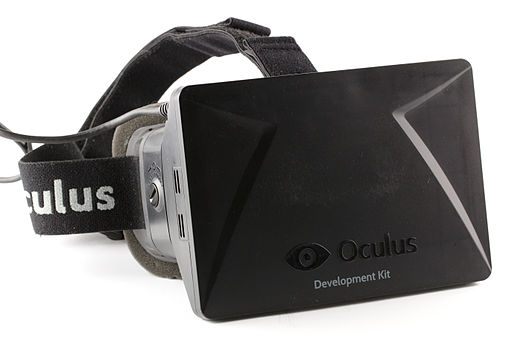
Facebook have announced plans to acquire virtual reality firm Oculus VR for $2bn.
Oculus set up a Kickstarter campaign to fund the Oculus Rift virtual reality headset back in 2012, describing it as “Designed for gamers, by gamers”. So why has social media giant Facebook snapped up Oculus?
The Facebook announcement said: “Virtual reality technology is a strong candidate to emerge as the next social and communications platform”. With the rate of user growth continually falling, Facebook is clearly out to find new ways of enticing people to sign up for the service. But is virtual reality really the way to do that? And why did Oculus think it was a good idea to team up with Facebook?
A blog post from the Oculus team reveals vague notions of creating a “platform for interaction” in partnership with the Zuckerberg crew. One could guess that the technical experience Facebook’s engineers have with large-scale delivery of services is something Oculus were interested in. If they want the Rift to reach as many people as possible, they need the help of someone like Facebook to achieve this, especially with the looming threat of PlayStation creator Sony’s venture into virtual reality.
However, with increasing concerns over privacy, something Zuckerberg believes is no longer a “social norm”, the acquisition of Oculus by Facebook is being met with worry and even anger by members of the gaming community. Responses to Oculus founder Palmer Luckey’s post on Reddit about the acquisition were overwhelmingly negative.
Minecraft developer Markus “Notch” Persson has stated that he will no longer be exploring the possibility of bringing Minecraft to the Oculus Rift. The key point he makes is “I don’t want to work with social, I want to work with games.” This may well be true for multitudes of other developers who originally backed the Rift on Kickstarter with the intention of developing games for it, not social experiences.
This also raises the issue of the unwritten contract of Kickstarter. As game developer Bennett Foddy put it: “The grassroots enthusiasm that funds Kickstarter is at odds with intentions to either sell out or use the Kickstarter money to bootstrap traditional investors”. While Oculus have by no means violated the terms of their Kickstarter funding, going from a platform for indie projects to being bought out by the biggest social networking company leaves a bad taste for followers of the Rift project.
No comments:
Post a Comment